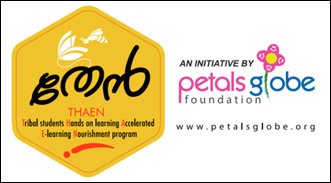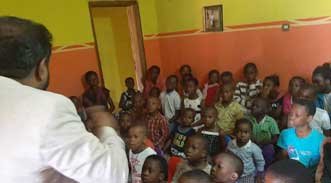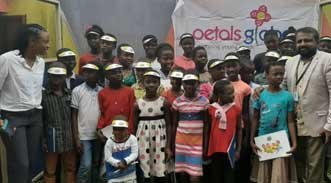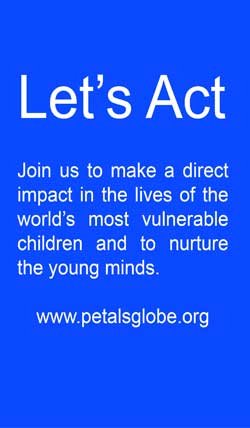
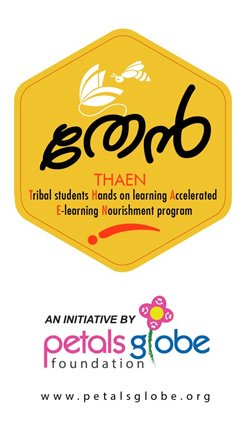
Many of the children in the world are in vulnerable situations and are impacted by migration, domestic violence, child labour, pandemic like COVID-19 and the list goes on..
In the COVID-19 scenario,
remote doesn’t mean cut off.
Even without internet access or cell phones, students in remote areas are still learning during
COVID-19 related school closures with the sheer commitment of good minds.
With no internet access, no cell phone and no television in home, many students rely on the weekly visits from their noble teachers and people like you.
Bridging the education gap
Many months have passed since school closures across the globe and millions of children are temporarily out of class. But while many children have been able to continue learning remotely, in more isolated areas,
online learning isn’t an option.
The COVID-19 pandemic has underscored the already significant difference in access to education between those living in urban areas and those living in rural parts. Almost two thirds of the households lack internet connectivity, leaving many children –
especially those outside of towns and cities – unable to take advantage of remote learning tools.
That’s where the existing teachers and NGO volunteers come in. Utilizing materials that cover traditional subjects – such as mathematics, science, history, languages, family-based activities like cooking and crafts, and new guidance on preventing the spread of
COVID-19, teachers who would usually travel to a classroom are visiting students’ homes, checking on their progress and setting homework.
The initiative to reach children at risk of falling behind, includes donations of digital devices and data plans for teachers to keep in touch with students, production of educational programmes for radio and television, and delivery of intercultural and bilingual education guides.
And we strongly feel that
projects like THAEN conceived and developed by PETALS GLOBE would turn out to be a panacea to the remotely placed students even after the pandemic
since it works off line.

BUILD, THINK, APPLY, PLAY and EXPLORE through
SELF LEARNING
“
E Learning accelerated with
Hands on Learning based on the aptitude based approach to spot out the interests and skill sets of students and fine tuning them to excel in life through their passion “
THAEN is an academic solution to nurture the
Tribal and Other Marginalised Students through e-learning accelerated with Hands On Learning Programme.
India has many accomplishments to celebrate in education. More than
70 million children attend pre-primary school, there is a
near universal primary enrolment rate and there is a consistent increase in upper primary (lower secondary) participation.
But, with all these positive news we should make it a point that,
Out of 100 students, almost one fourth of girls and boys drop out of school before completing the full cycle of elementary education, and often they are the most marginalized children.
Out of the children who are still out of school, a majority are from
marginalised communities including Scheduled Tribes, Scheduled Castes and minority groups. Challenges remain because most of the children who are in school are not learning at grade appropriate levels.
The quality of teaching and learning practices affect the school attendance level.
Seasonal migration, poverty, child labour, lack of access to and awareness of social protection measures also lead to children dropping out of school.
E
very NGOs focusing on education need to support government to create more awareness of social protection measures and to enhance the quality of teaching and learning practices as no government can alone do this, inequities in access to quality early childhood education:
In a vast country with high population density like India, there are approximately
20 million children, between the ages of 3-6, that are not attending preschool. This is primarily because of lack of basic infrastructure, qualified early childhood educators and appropriate learning materials. Low school readiness levels in cognitive and language skills prevail for children in government-run Anganwadi Centres (AWCs) as well as the private preschools.
(Source: Longitudinal study, Center for Early Childhood Education and Development, Ambedkar University, ASER Centre)
THAEN is a project ensuring all young minds in India and rest of the world to facilitate access to inclusive and equitable quality education. We believe that the LEVELLING of EDUCATION would bring out the holistic development of the nation.
How to enhance the Learning Outcome ?
Large scale learning assessments and surveys have consistently pointed to the poor learning levels of children even after eight years of elementary education.
A critical factor impacting learning outcomes is the absence of strong foundation provided by quality early childhood education. Another is the dearth of well-qualified and trained teachers. Even when recruited, teacher absenteeism remains a concern due to many reasons.
All these factors plus the recent COVID PANDEMIC induced School Closure motivated Team PETALS GLOBE in developing the project, THAEN.
THAEN address the learning hurdles faced by the marginalised students who live in remote area and far from the main stream.
These Children are trained to do SELF LEARNING supported with periodic reviews and refreshment programs.
The e-learning modules of THAEN project would be presented akin to the day to day life situations faced by the students.
The concepts would be simplified through animations and videos reflecting the environment they live in or familiar with. Learning kit is given to each student with e-learning materials preloaded tabs or laptops and Hands On Learning materials.
THAEN Curriculum Design is :
employment oriented, especially focusing on traditional and indigenous practices.
Petals Globe Foundation is very keen on identifying and developing the inherent aptitudes of each student equipping them to lead a passion oriented career.
Perfectly set on LEARNING OBJECTIVES and KNOWLEDGE OUT PUT expected from student on completion of the course.
Periodic Assessment based on Leearning Objectives and desired Knowledge Outcome is carried out at each level of the course.
THAEN project focus on the SHEER SELF-DEPENDENCE and SELF-DEVELOPMENT of each student through SUSTAINABLE SELF LEARNING PROGRAM. Through projects like THAEN, PETALS GLOBE FOUNDATION wish to contribute towards the minimisation or a dreamy eradication of these issues by working closely with the Government of India ; especially the New Education Policy 2020, Organisations like UNICEF, Civil society and Private Sector Education institutions to ensure quality, grade-appropriate education from early childhood through elementary for all boys and girls, particularly the most disadvantaged with learning outcomes at grade appropriate levels through timely enrolment, regular attendance and flexible learning for elementary and secondary aged children.
Also we wish to support the government in strengthening life skills development with skills for learning, self empowerment social skills and employability for young minds aged 3 to 18 years and above.
According to UNICEF, these soft skills are pre-requisites that allow children to negotiate the very dynamic Indian societal context.
And with the special focus on GIRL Child, we wish to augment the efforts of Government to improve the learning levels by ensuring fundamental and transferable skills development.
As we all know, Government schools in India are the largest providers of education though there is substantial increase in the number of private schools. We need to adopt a strategy ensuring rights based education that addresses social and gender inequalities in education by soliciting wholehearted support from private sector schools as well.
At PETALS GLOBE, We are committed to advancing the rights of all girls and boys in India, especially the most disadvantaged.





